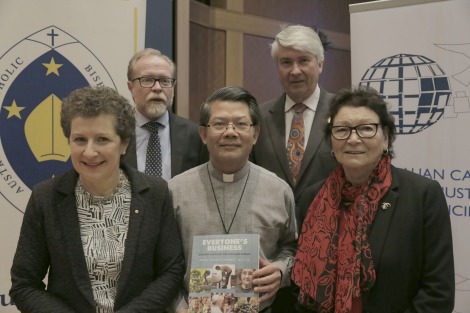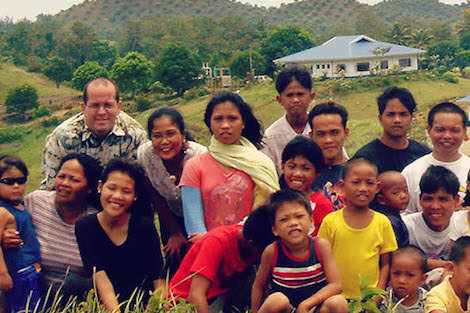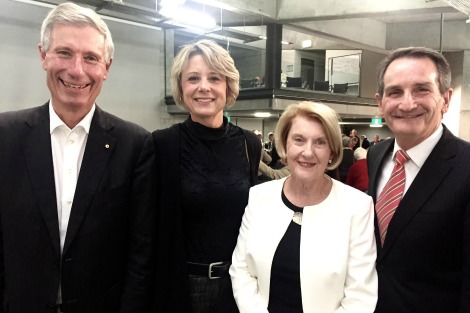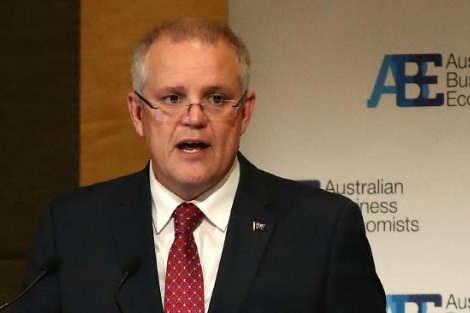Keywords: Catholic Health Australia
There are more than 200 results, only the first 200 are displayed here.
-

RELIGION
- Frank Brennan
- 11 September 2017
2 Comments
The real call of Everyone's Business is to move beyond them and us to admitting that there is only us. If we are truly to build an inclusive and sustainable economy, it can't be just those in full time paid employment who are part of that economy. We take seriously the principles of neo-liberalism, letting the market decide. But we set limits on the market for the common good.
READ MORE
-

RELIGION
- Andrew Hamilton
- 06 September 2017
11 Comments
The general argument of the Australian Catholic Social Justice Statement on the economy is that Australia is a wealthy economy in which too many people are marginalised. In response to the litany of neglect and abuse that it details, the statement calls for a new view of the economy as the servant of people, and not vice versa.
READ MORE 
-

RELIGION
- Frank Brennan
- 30 August 2017
6 Comments
'There was one controversy in which Lionel Bowen was involved that does provide good lessons for the contemporary Catholic considering the desirable law or social policy on a contested issue - lessons for the citizen weighing what is for the common good. Back in 1979 there was debate in the Parliament on a motion which was framed to stop Medicare funding of abortions. Bowen, a strict Catholic, was strongly opposed to the motion. He did not think the motion was about abortion. He thought it was about money.' Frank Brennan's 2017 Lionel Bowen Lecture
READ MORE
-

AUSTRALIA
- Frank Brennan
- 29 August 2017
10 Comments
In an age of 'budget repair' when both sides of politics are trying to contain the welfare budget, the search for savings and silver bullets is relentless. If Ministers Porter and Tudge are really seeking 'a way of assisting people to get off drugs and back into work', they should convince their cabinet colleagues of the need to increase the Newstart and Youth Allowance so that it might provide a real start for assisting people to survive with dignity while preparing for and getting back into work.
READ MORE 
-

RELIGION
- Brian Lucas
- 22 August 2017
7 Comments
In the Sydney Morning Herald on 17 August Lindsay Murdoch reported on the public hearing by the Australian Parliament’s Joint Committee investigating a Modern Slavery Act. The proposed legislation is broad but this article focused on one aspect—the institutionalisation of children.
READ MORE 
-

RELIGION
- Frank Brennan
- 26 June 2017
6 Comments
Here in Ballarat, you know better than most other Catholics that respectful relationships in the church community have been rent asunder by the depredations of child sex offenders whose exploits went unchecked by those ordained to exercise tradition, authority, teaching and discipline. We will strengthen respectful relationships only with a voluntary commitment to truth, justice and healing — and not one forced by a royal commission or public odour.
READ MORE
-

RELIGION
- John Warhurst
- 23 May 2017
54 Comments
Catholics have a proud record of exercising their democratic rights within Australian democracy as voters, members of political parties and lobby groups, and as elected representatives. But within their own church they have been taught to leave their democratic rights at the door. Now is the time to challenge that norm in parishes, dioceses and the wider church. In responding to the royal commission the church needs an infusion of democratic values, including transparency and accountability.
READ MORE 
-

AUSTRALIA
- Julie Edwards
- 10 May 2017
5 Comments
'Labor-lite' or not, there are many investments contained in the budget which will work towards a more just society, including the securing of funding for the National Disability Insurance Scheme by raising the Medicare levy, and the needs-based approach to school funding, dubbed 'Gonski 2.0'. But among these commitments that seek to create a more equitable Australia, this budget again seeks to vilify welfare recipients, among the most vulnerable members of our community.
READ MORE 
-

RELIGION
- Frank Brennan
- 08 May 2017
1 Comment
Our Church is presently a strained, outdated social institution with an exclusively male hierarchy and clergy. But it is also the privileged locus for us to be called to the banquet of the Lord sharing theology and sacrament which have sustained the hearts and minds of similar pilgrims for two millennia. Thank God for Pope Francis who is showing us the way, helping us to find meaning in our changing and chaotic world, putting a fresh spring in the step of all those Catholics holding in tension the prophetic and the practical, the theological and the humanist, the tradition and the contemporary reality.
READ MORE
-

AUSTRALIA
- Frank Brennan
- 07 May 2017
7 Comments
Part of the cost of the double dissolution election last July has been the creation of a Senate with the largest, most diverse group of crossbenchers ever. This will make the passage of any new contested Budget measures difficult, particularly given the Prime Minister’s vulnerability on his right flank, and the Labor Party's propensity to mimic the Opposition tactics adopted previously by Tony Abbott. The government needs to create a clear narrative as to how it will achieve equitable and sustainable growth through this Budget.
READ MORE 
-

RELIGION
- Frank Brennan
- 29 March 2017
1 Comment
'We need to be more focused on grace, Christ and God's word, rather than just on law, the Church and papal utterances. But today, I will draw more on law, the Church and the Pope to point us towards those more fruitful domains: grace, Christ and God's word. Our future visioning needs to focus more on the gospel imperatives including the option for the poor and the dignity of all persons, including those who are non-believers.' Address to Catholic Health Australia's Catholic Governance Symposium, 27 March 2017
READ MORE
-

RELIGION
- Frank Brennan
- 17 February 2017
3 Comments
The commission's forensic scrutiny of past actions of church officials in no way constitutes an interference with the freedom of religion. Its spotlight is to be welcomed, provided only that it is shone on a truly representative sample of all institutions which have been found wanting and provided the same light filter is applied to all institutions. I do however have a problem with the commission making findings on issues like the want of compassion when those findings are made only against a Church.
READ MORE